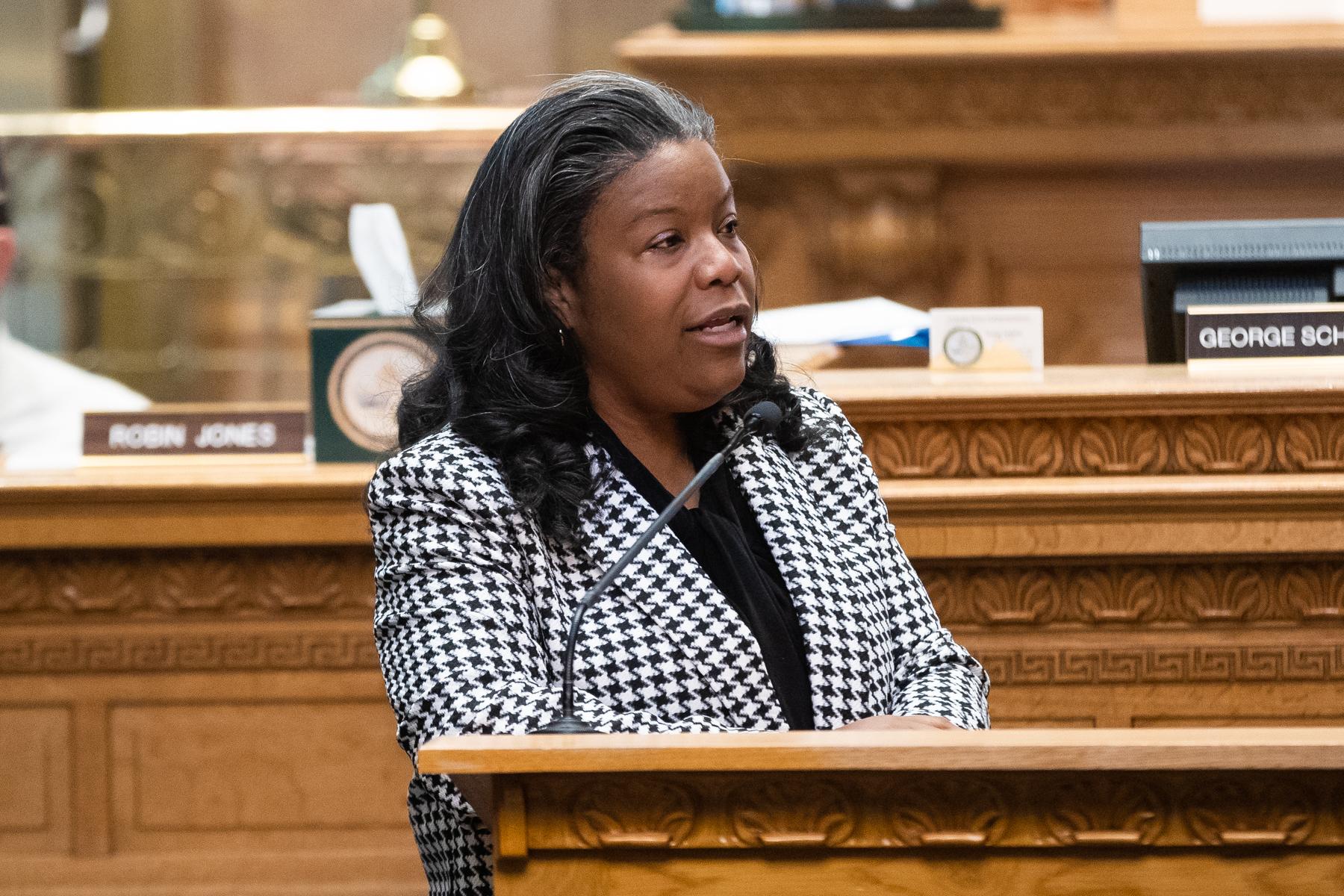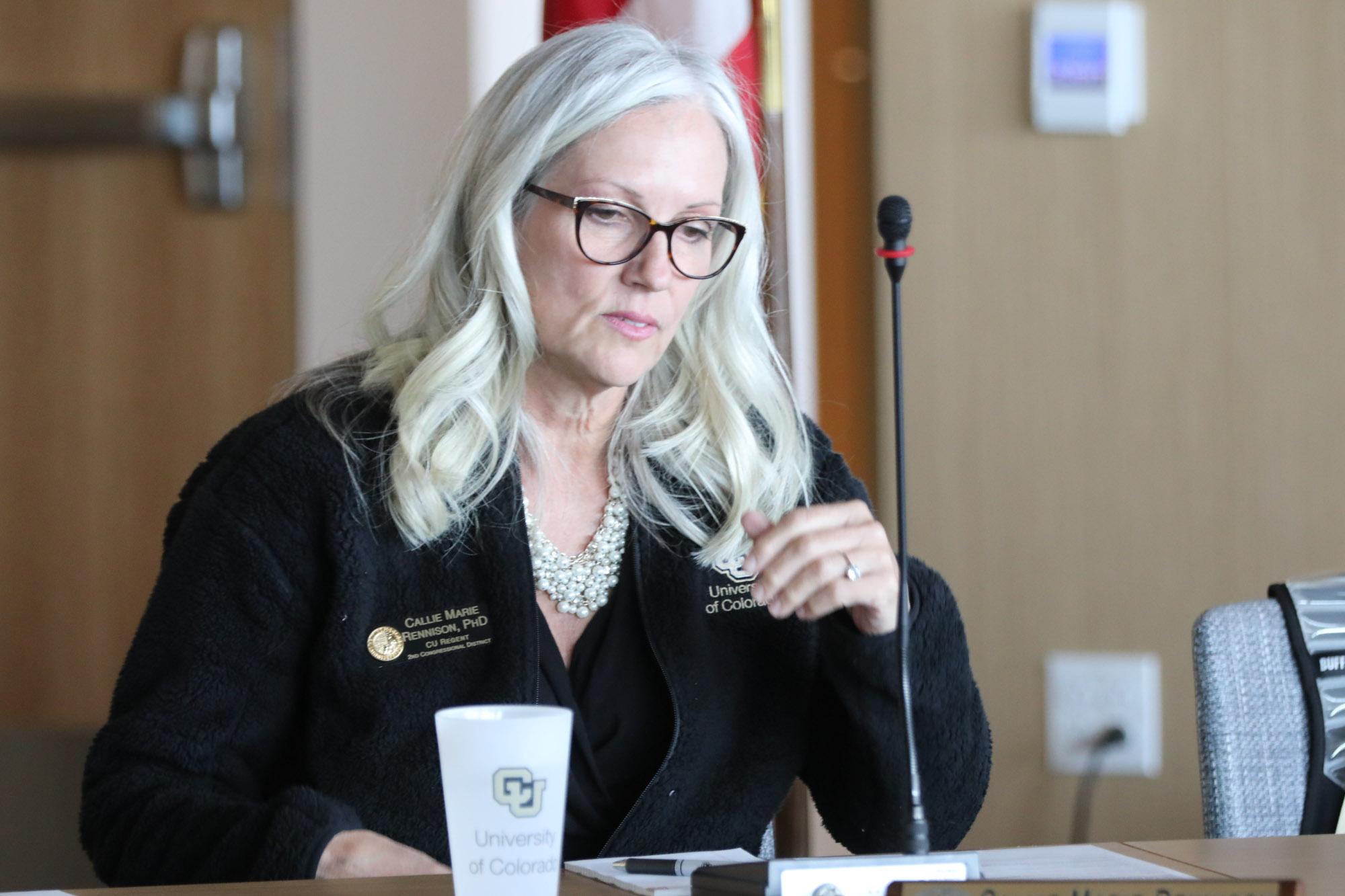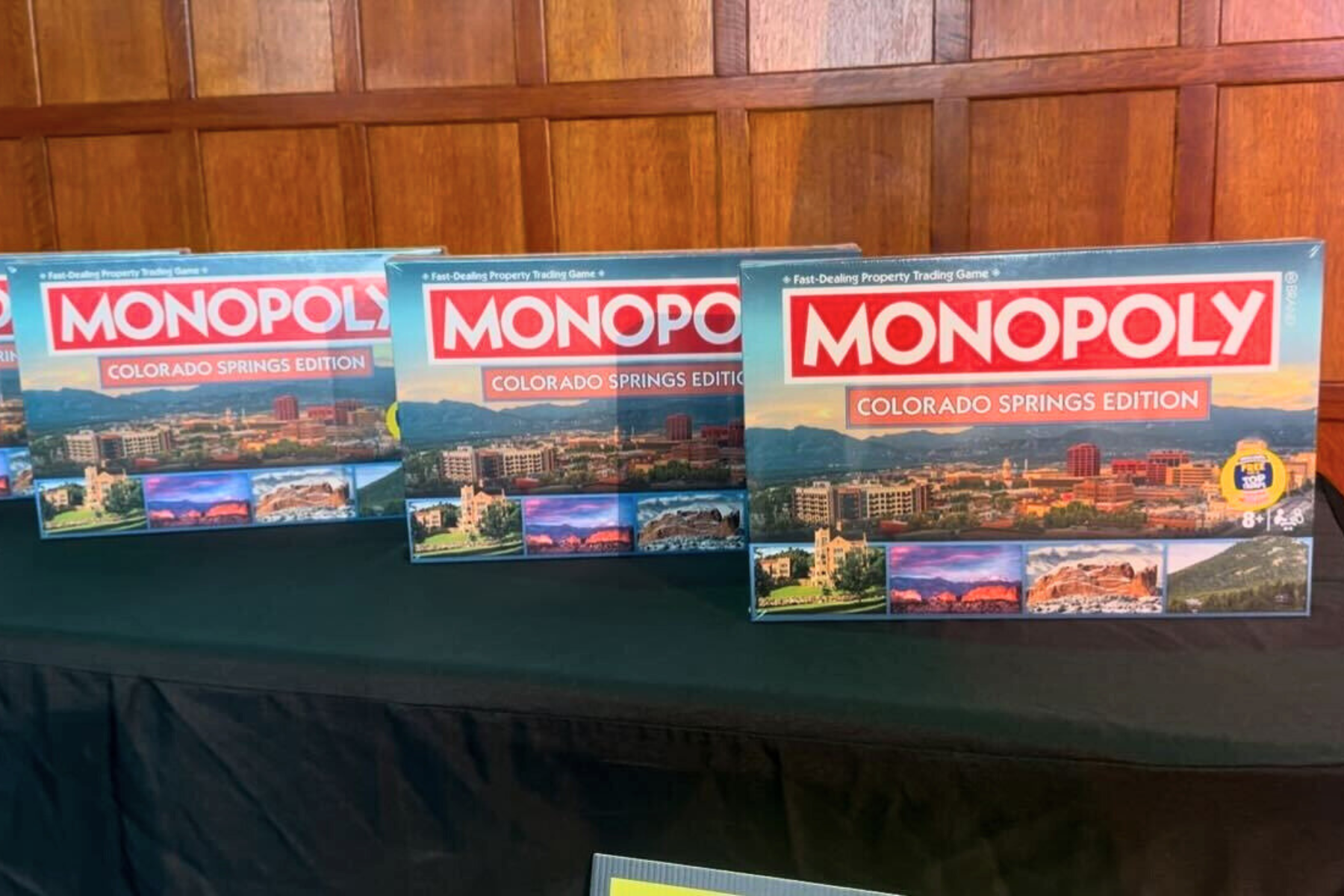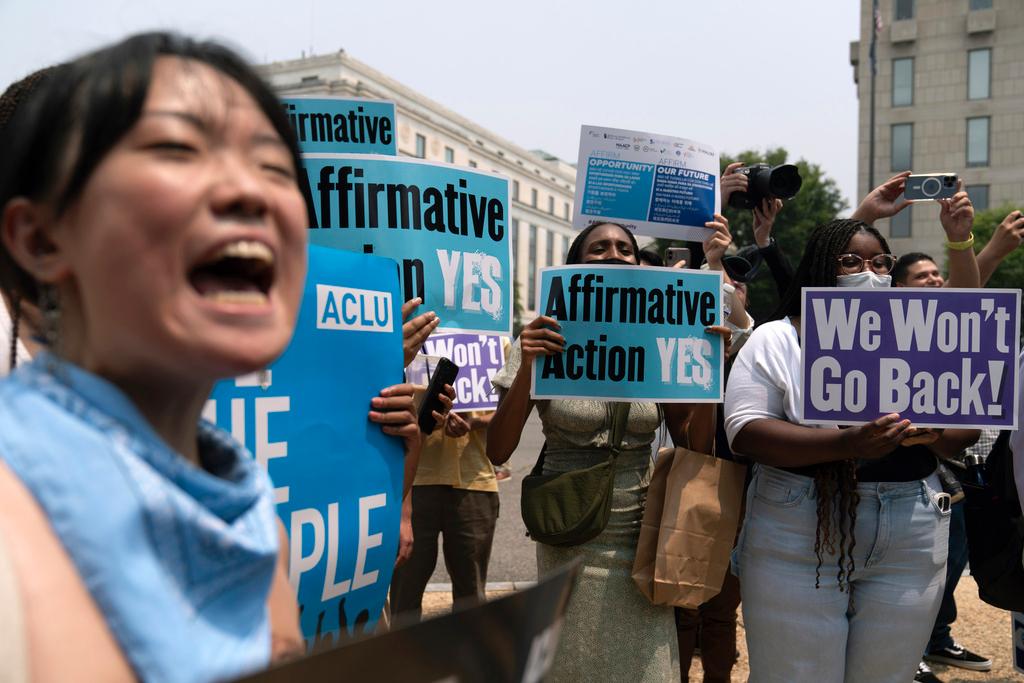
Democratic State Rep. Jennifer Bacon finds herself at the intersection of two key issues in Colorado right now — school safety and gun control.
As a Denver school board member in 2020, Bacon co-sponsored a resolution that removed armed school resource officers from campuses. After a shooting left two deans wounded last week at Denver’s East High School, many people in the community are questioning that decision.
And now, as assistant majority leader of the Colorado House, Bacon is heavily involved in the debate over new gun laws.
She spoke with Colorado Matters host Ryan Warner Tuesday.
This interview has been edited for clarity and length.
Ryan Warner: Representative, thanks for being with us.
Rep. Jennifer Bacon: Thank you for having me.
Warner: At East High School last week, the suspected shooter was under a safety plan that required him to be searched every day for guns. Two deans conducted that search that day. They were shot and wounded. There were no armed officers in the building. I guess first off, why did you, as a school board member at the time, push to remove SROs, school resource officers?
Bacon: The story of removing school resource officers began almost 20 years ago. The conversation arose after Denver and Denver Public Schools, along with a group of parents and students and national organizations, wanted to investigate zero-tolerance policies. Particularly after Columbine, we thought we should add police presence to schools to keep students safe. After a couple years of that we saw that police presence in schools increased the number of touchpoints that young people had with law enforcement and therefore access to creating or having criminal records.
Warner: And you believe that those were inappropriate touchpoints, I'm guessing?
Bacon: Yes. The purpose was to keep students safe from mass shootings and what we saw was that things that would have otherwise been referred to school discipline systems were referred to law enforcement. We saw a disproportional number of students of color being ticketed or arrested for behavior that just five years before they would not have been. That began to outweigh some of the other safety concerns and over the course of a decade, that disproportionality had not changed.
Warner: And so you co-signed a resolution to remove school resource officers.
Bacon: I did. What brought me to the school board was to talk about community voice and impact and what was happening in schools, whether it was from school closures, school assessments, but also to end the school-to-prison pipeline. And it had been made clear by a lot of my community members, particularly members of communities of color, (that) we want counselors, not cops, in schools.
Warner: You know, you used a word earlier, outweigh. That there came a point where you thought the benefit of school resource officers no longer outweighed the drawbacks. I want to know if you think there's some level of police presence at a school that makes it worth it for the potential deterrent effects.
Bacon: We had questions on the efficacy of the program. There were other incidents of harm in schools that did have SROs. And over the course of the last 25, 30 years, we've seen the number of SROs increase in schools and the number of school shootings increase as well, so we could not necessarily say there was a direct corollary.
Unfortunately, we had other incidents, not quite one in which staff was harmed, but where students were harmed on campuses where SROs were present. Communities asked us then, aren't you supposed to keep us safe? But what we did know was that we had a mission and a vision at Denver Public Schools to get all of our students college and career ready and this practice, over the thousands of tickets that we had issued, was tangibly getting in the way of that. It is not a small thing to have a ticket, to stand in front of a judge, to be exposed to criminal records and bench warrants, for behavior that in other school districts would be detention.
Warner: Did you look for evidence that having a school resource officer might deter a mass shooting? That's not something you turned a blind eye to necessarily, is it?
Bacon: We did not. And as I said before, we had questions on the efficacy of the program.
Warner: You did look for that evidence though?
Bacon: Sure. And what was happening at the time, if you recall, STEM was right before that.
Warner: There was a shooting at the STEM school in suburban Denver.
Bacon: We had conversations about Parkland (Florida) where there was also an SRO present, there were also armed guards present. And again, part of the larger conversation of gun violence and the fear of guns was breaking down what the presence of law enforcement meant in buildings. It was expected that students would not necessarily respond to badges and handcuffs. The Denver Police Department said guns were part of their uniform. They would not separate them. Students were expected to (have) their behavior controlled by the presence of a weapon and that too was part of the conversation of gun violence and anxiety that students said scared them, so we did ask these questions.
We also noted that if people come and intend to do harm they will, and at best SROs would be there to shoot back. From what we had seen, that also came at a risk of other people being hit, which we actually saw from STEM. The decision was not a convoluted one. It was not a knee-jerk reaction. It was the result of decades-long questions.
Warner: Two decades, you said. I didn't know that.
Bacon: It was student-led as well. We got some criticism that we were making a knee-jerk reaction to the death of George Floyd. What people didn't understand who may not have experienced the conversation of police brutality over the years, is that the death of George Floyd was more of an exclamation point to the end of the sentence that people had been writing for a long time. It had been made aware that law enforcement may take the life of people with impunity and that scared a lot of people and that scared us too.
Warner: Take me to the day of the East High School shooting, when two educators were shot. Did you have a moment of thinking, ‘gosh, what if an SRO had been present?’ It is not clear by the way that a school resource officer would've conducted the sort of search that the deans were doing. So we can't assume that would've been a role taken on by an officer. There are issues related to search warrants when law enforcement engages in behavior like that under one of these safety plans. But was there a moment where you thought, did I make the right decision?
Bacon: I had a moment of asking that when we passed the policy, as well as last week. And part of what I processed was also what if a police officer was there? Would he have left the campus alive? Would other students have been hit as well? All of those things went through my mind.
Warner: Any regrets then?
Bacon: I don't have regrets on the policy. This young man knew he was going to be searched by a human metal detector, if you will, and he still brought a weapon. So it may not be one thing, and the conversation about SROs should not be equated to the tragedies that happened. That is critical. So do I regret the loss of life and the harm? That is absolutely true. Sometimes these conversations can never be the one answer. We need to do all that we can to prevent, but we need to be sure what we're doing actually works and also does not simultaneously cause deep harm as well.
Warner: This, to you, is a conversation that is not as simple as whether there's an officer in this school. I think I hear you say.
Bacon: Exactly. I'm not entirely sure what the safety plan said. I have not, that has not been shared with me.
Warner: The alleged shooter’s safety plan.
Bacon: Exactly.
Warner: He'd been expelled from another district in part because of his past with firearms.
Bacon: And particular neighborhoods see this differently, have relationships with firearms for different reasons. The issue of youth gun violence is not new to me, nor my neighborhoods, or even across the metro area. We've talked to young people on why they carry them, and the majority of young people say they carry them for the walk home.
Warner: Chalkbeat, the news site, has reported that a record number of weapons was found on DPS campuses last year, 200 total, including 13 guns, 28 fake guns.
Bacon: Thirteen guns, 28 fake guns. We have had issues with guns before as well, you know, expulsions did not cease with the SRO program. For what it’s worth, the conversations that we've had with young people outside of schools also reflect more interest and easier access to guns. What this means is also young people are bringing the issues they have in their community into schools. However, the purpose of weapons in schools may not exactly be using them in schools. I think that's the point that I'm making and it's not by any means supposed to make anyone feel better, and it is a very sad one. I think this is why we're all having conversations on gun control.
Warner: I'll say that he was on probation for conduct in a neighboring district. I wonder if you think about the young man's parents?
Bacon: Absolutely. (For) school districts and teams our best hope is to be partners with families, and we don't always get to do that. We are often asked to fill in the blanks when those relationships may be frayed or may put students in harm's way. The burdens on school districts these days are much more complicated than they've been in the past, which is why we cannot be responsible for it all. We need support.
Warner: I want to say that since the East High School shooting, Denver Public Schools has said it will detail officers and additional mental health counselors at high schools throughout the district at least through the end of the school year. What do you think of the decision? Is it a mistake?
Bacon: I think the school board, having been there, should make their decisions based off the information they have and the responsibilities to be responsive to their community.
Warner: Is this a pendulum? Does it just keep swinging back and forth?
Bacon: I think until we're at a place where we can actually be equipped and resourced and understand these issues, we will always want to react. That's human nature and that's okay. What (to) always be mindful of is keeping track of perception and reality. We need to be open-minded that some of the solutions to safety may be broader than one or two actions.
Warner: Give me an example.
Bacon: We need to find better coordination between law enforcement, city resources and support for young people outside of school. Denver Public Schools has often been associated with the full care of children and our purpose is to educate, so we need to be working with Denver Health, the city and county.
We need to support our kids in having access to after-school resources, mental health, all of those things to support students in making different decisions than guns can solve their problems. We need to talk about how we keep guns out of the hands of children, how we keep guns out of the hands of people who have ideations of self-harm and community harm. All of those things are a part of this conversation and all of those are things I heard from the East community as well. And I want to thank them – I want to apologize for the circumstances that they felt the need to come directly to this building, the Capitol. But I want to thank them for also thinking deeply about the issues.
Warner: What are you apologizing for when you say they had to come here to the Capitol? There were several marches actually from East to the state Capitol. One was after the shooting death of a young man outside the school, and then again after the shooting of the administrators.
Bacon: Part of that apology is that we have not taken steps as a matter of law sooner. We are also simultaneously having conversations on changing statute right now that perhaps we could have had years ago. Students came to this building after Parkland, students came to this building after, fill in the blank, and we are just now in a place of passing particular laws. We just did safe storage last year instead of five years ago, after the young woman from Florida flew here and bought a gun and shut down half of Colorado.
Warner: Oh gosh. I remember.
Bacon: We are still having those conversations.
Warner: One loses track of the incidents. I remember that.
Bacon: It didn't matter who was in the building to defend against a long gun in a perch. So we have been having these conversations for a long time.
Warner: Well, let's segue to your current role as a state representative, as a leader in the House for the Democratic Party. There are any number of gun bills that are going through the legislature right now, expanding, for instance, the Red Flag Gun law, those Extreme Risk Protection Orders. We've seen that they have been used many times in some places and almost never in others. I understand you'd like to have a hotline that goes along with them?
Bacon: Part of the conversation around the hotline actually came to us as a result of some research that CPR completed, saying that many people did not know what an ERPO was, let alone how to access it. Part of the hotline concept was just to be an accessible way to get information. It wasn’t necessarily intended to be a crisis response hotline but since we've expanded who has access to (ERPO), we want people to know in the state that there is a resource to help them navigate how to access one and if they qualify to access one,
Warner: Because these requests that temporarily remove firearms from people who may be a threat to themselves or others, they can be placed by law enforcement, but they can also be placed by the citizenry, so presumably this is about educating everyday people about the system.
Bacon: And it's a limited citizenry. It's not that your neighbor can just suspect (a threat) and go get a protective order.
Warner: And there's due process involved.
Bacon: Absolutely. It is people who have deeper relationships with people, who spend a lot of time understanding their mindset and who are around long enough to perceive and see if any threats are made. The petition still needs to be reviewed by a judge and weapons are not taken permanently, but at least through the crisis or for a period of time.
Warner: I'd like to talk about ghost guns. My understanding is that any minute now, any day now, a bill will drop to ban them in Colorado. It appears that ghost guns are involved in the East High School shooting, as well as in the Club Q shooting in Colorado Springs. Do you want to speak briefly to what this bill would do precisely?
Bacon: I actually do not have the details. It has not been introduced, and so we have not seen all the language.
Warner: Do you want to ban ghost guns?
Bacon: I think there are a lot of questions about banning weapons and I think this is one of them. You know, the issue with ghost guns really is talking about untraceable weapons.
Warner: Weapons without a serial number that might have been pieced together from different parts and pieces bought online.
Bacon: There have been other discussions about how to hold people accountable for parts and pieces. We just had another bill about that, holding manufacturers liable in the event they create these products to alter weapons or to create illegal weapons that increase the harm. But the ghost gun conversation is a critical conversation by way of just the sheer number of weapons that are in this country and that people are accessing, so we need to take steps to limit those as well.
Warner: All right. There is also a proposal to increase the minimum age for gun purchases in Colorado to 21, up from 18. But I'll note that the alleged shooter at East was 17 and still had a gun. We hear of so many other shootings involving teens. I want be very clear this is beyond East. Why do you think the age should be changed? You can vote at 18. Why shouldn't you be able to have a gun at 18?
Bacon: In the gun rights advocacy space they will talk about a weapon as a tool. This product, this tool, this weapon is incredibly efficient at its purpose and where it meets young people in their ability to process that is the concern about access to weaponry.
Warner: When you say process, you mean like their brains?
Bacon: The frontal lobe, the thinking, whether it is to harm themselves or others. Unfortunately, the completion rates of suicide as well as community harms with weapons is much higher than it would be with any other tool so part of the conversation is, can young people handle it, and process their purpose and need.
We'll also point out that the young woman from Florida who bought a gun was 18. This is part of a suite of bills to recognize the number of young people who are shooters, particularly for school shootings, that are in this age bracket and at the very least they shouldn't have a legal means of buying these weapons. (The bill is) in concert with other things that we're talking about – background checks, locks, training. All of these conversations are part of the discussion but this is part of the trajectory in which we're moving in a step we could take this session.
Warner: Representative, two realities beyond Colorado. One is the more conservative Supreme Court has been very deferential to the Second Amendment so far. Two, you pass a state law and someone goes into any of our bordering states, be it Nebraska, Kansas, Utah, Wyoming, Oklahoma, and they get their hands on what they can't get their hands on in Colorado. Do those two realities make the legislatures work a fool's errand?
Bacon: Not a fool's errand. It may make it difficult.
There are pieces of law that have not been touched that even our Supreme Court has said have withstood the test of time, one of which is time, place, and manner in which you can carry weapons. We passed a law last session for example that you cannot open carry in places where people vote.
I think when it comes to going to surrounding states there are other federal laws about transporting weapons to lean on, but I would propose that these may also be our proverbial speed bumps. If we want people to go slower, you have to take tangible steps and if that means it saves some time and therefore saves lives it's worth doing.
Warner: How much is the Supreme Court on your mind as you’re crafting language — does this say ‘shall’ or ‘will’? You know, the kind of brass tacks of lawmaking.
Bacon: It's on all of our minds and it's on all of the circuit courts’ minds as well. We saw out of Florida, in that circuit, a 21-year-old ban be upheld. It’s not just here in Colorado. I think the legal community is trying to understand, navigate, as well as test theories. But if we have some data to suggest certain actions will save lives we’ll try it, it is worth it, and we'll also put our best legal minds on it as well.
Warner: You represent Denver County but I'm thinking of people in Weld County. You’ve hinted at the notion of the cultural reasons people might have firearms. You invoked the walk home for kids who don't feel safe in a city as they leave school, but then you think of a place like Weld County or counties on the Western Slope where law enforcement may be quite a drive away, the response time isn't going to be the same as it would be in a city. Hunting culture is much stronger. These are realities for Coloradans as well. How do you keep those folks in mind as you do this kind of legislating?
Bacon: It is important to us to hear from our colleagues and listen to our colleagues, even if they say that we don't.
Warner: The Republicans in the marathon gun session that went over the weekend, really thought that the Democrats curtailed debate by using a particular rule. They didn't feel heard,
Bacon: And I would say differently – the conversations were had, they were never limited to five minutes, we're talking about hours over the course of committees (and) on the floor.
In addition to listening, we also want to be able to work with our colleagues to understand those nuances, to figure out if we can make some changes to our bills, but both parties have to be open and willing to do that. It's one thing to say that we're not heard, it's another to not come to the table to share ideas and we want to encourage our colleagues from across the aisle doing that, too. All demands have to be negotiated, even ours.
I believe that we took into account some of the things that we heard. For example, we gave the highest level of civil procedure, in civil court operations, the highest level of deference to ERPOs. It requires clear and convincing evidence of substantial risk. It is not just, ‘I think you have a gun, and I don't like you’ and in some ways it might actually be easier to remand someone's physical person than it is to take their weapon, given the way that some of the language is written.
Warner: That actually habeas corpus is somehow weaker…
Bacon: Or if someone is in a mental health crisis. You know, law enforcement can believe that with probable cause and put you in holding for three days without going to a judge.
A lot of this is still up to local discretion. It's still up to local district attorneys and judges to make these decisions. Some evil-doer in Denver is not making these decisions in each of these communities.
Extreme Risk Protection Orders are not unique to Colorado. Nineteen states have them. We have seen data in polling that says people believe that those who have access to firearms should use them responsibly. People believe that those who have access to firearms should be able to handle them. While you do have a right to possess a firearm, you do not have a right to use it and harm people. That is what we were trying to balance and we do think that most people, and I would even say across ideological parties, believe that dangerous people shouldn't have access to weapons.
I think that when it comes to this question of gun violence across the country, more people than not are ready to think deeply and to do the hard work in figuring it out. If every three days we have a school shooting, regardless of whether an SRO is in the building, regardless if there are metal detectors, regardless if someone is 6 years old, 14, 15, or 28, everybody is ready to have conversations and they need to be deep.
Warner: Thanks for being with us.
Bacon: Absolutely. Thank you for having me today.









